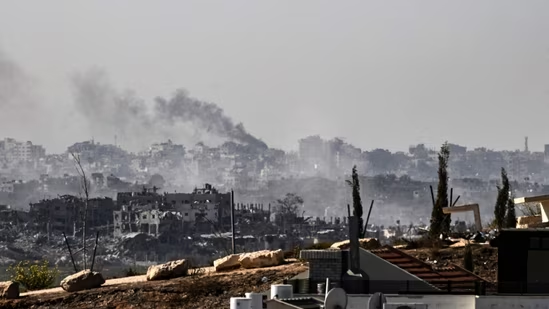Could the Israel-Hamas war trigger unrest across the Arab world?
Read all our coverage of the war between Israel and Hamas  PREMIUM
PREMIUM
ANOTHER DEADLY war between Israel and Hamas is a tragedy for Israelis and Palestinians. It also risks crises beyond the Holy Land. So far the war remains mostly confined to Gaza’s borders (though there are risks of a second front opening with Lebanon). But secondary effects, in the form of mass protests, are a mounting concern for “the Arab world”, a collection of 450m people spread across nearly two dozen countries. The region is sympathetic to the Palestinians: their dispossession is apt to stir up anger and protest like little else. Risk modelling by EIU, our sister company, shows which countries are particularly vulnerable to social unrest.
The EIU grades countries on a scale from zero (the lowest risk of unrest) to four (the highest). Three countries have had their scores revised higher since the outbreak of war in Gaza: Egypt, Jordan and Yemen are now considered to be more at risk given their political or geographical proximity to the conflict, which could inflame pre-existing tensions.
In Yemen existing risk factors (including a broken economy and dire living standards) could be aggravated by the war, given the strong anti-Israel sentiment in the country and the risk of escalation by the Iran-backed Houthis, who are fighting government forces in a long-running civil war, against Israel. The country is now at level four on the EIU’s scale.
Egypt and Jordan, which neighbour the Palestinian territories, are graded three and four, respectively (up from two and three since September). Both are in dire economic straits, with Egypt’s average inflation for 2023 hitting 37% and Jordan’s unemployment rate above 20% (see chart). These factors could now mix badly with populations increasingly at odds with their governments’ handling of the war. Both Egypt and Jordan have diplomatic ties with Israel, which has infuriated Egyptians and Jordanians during the latest round of fighting. In Egypt, a recent rally in support of Palestinians quickly turned into an anti-government protest, with some chanting slogans popular during the Arab Spring in 2011. In Jordan, where almost half of the population is of Palestinian origin, growing anger led the government to recall its ambassador to Israel on November 1st—the first of the Arab countries with diplomatic ties to Israel to do so.
Even before the war began some countries were in a critical state, so the current fighting has not affected their EIU scores. In Sudan, for instance, a civil war between paramilitary rebels and government forces has raged since April. Lebanon—which is four years into one of the worst economic crises in modern history—is also highly vulnerable to unrest.
For now, protests across the Arab world in support of Palestinians have remained mostly peaceful. But governments are on high alert. As the war escalates, investor confidence may begin to dry up and countries that rely on tourism (such as Egypt and Tunisia) may see arrivals begin to shrivel. That is particularly problematic for countries where economies are already struggling. Combined with existing anti-government sentiment, a deterioration of living standards may lead to even more unrest in a region that is no stranger to it.
© 2023, The Economist Newspaper Limited. All rights reserved. From The Economist, published under licence. The original content can be found on www.economist.com
Continue reading with HT Premium Subscription
Daily E Paper I Premium Articles I Brunch E Magazine I Daily Infographics Subscribe Now @1199/year Already Subscribed? Sign In
Disclaimer: The copyright of this article belongs to the original author. Reposting this article is solely for the purpose of information dissemination and does not constitute any investment advice. If there is any infringement, please contact us immediately. We will make corrections or deletions as necessary. Thank you.
Title:Could the Israel-Hamas war trigger unrest across the Arab world?
Url:https://www.investsfocus.com








